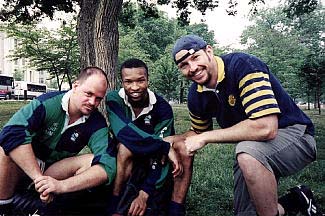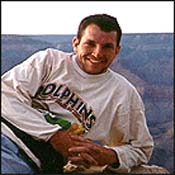 |
|
with Sexual Orientation Media Matters
Bingham, 31, was one of the United Airlines Flight 93 passengers who is believed to have rushed the cockpit and overpowered the armed hijackers, forcing the jet to crash in a remote section of Pennsylvania. It is widely assumed that the terrorists were aiming the Boeing 757 for a target in Washington, D.C.-most likely the U.S. Capitol.
Neither Hoglan nor others interviewed during the piece hesitated for a moment to speak of Bingham's sexuality. "The stereotypes I had about gay people flew right out the window when I found out Mark was gay," his mother said. The CNN segment included a news clips that showed Republican Sen. John McCain, who delivered the eulogy at a memorial service for the public relations executive, saying, "I may very well owe my life to Mark." (McCain was working in the Capitol Building on the morning of the terrorist attacks.) Images that aired with the piece reinforced the central role that Bingham's sexual orientation played in his life. One video clip showed him shirtless with his arms around two male friends, and another had Bingham bouncing frenetically to the beat of the pounding music inside a bar filled with men. Still shots included one of Bingham embracing a male friend and another of his photo on the cover of The Advocate beneath the headline "The Gay Heroes of the Terrorist Tragedy." The highly laudatory piece also included an interview with Tom Ryan, a gay man who has been a member of the New York City Fire Department for 19 years. Ryan praised gay and lesbian firefighters who worked non-stop, shoulder to shoulder with their straight colleagues, after the attacks.
 Mark Bingham (right) with friends from the San Francisco Fog Rugby Club The package ended with a statement about Ryan: "He hopes that the work of so many gay heroes will make things better-that Mark Bingham's life and death will fly in the face of prejudice." Rose Arce, who is openly lesbian, produced the piece that has aired several times on CNN since mid-October. NBC's coverage of Mark Bingham came during a Dateline segment devoted to the passengers aboard Flight 93. In stark contrast to the CNN package, the hour-long broadcast made no mention whatsoever of his sexuality. The omission was not an accident but a conscious decision. "Certainly, I was aware that Mark Bingham was gay," Susan Hoffman, lead producer for the NBC program, told the Washington Blade. "But our story wasn't about profiling the people on the plane. Rather, it was about all the circumstances that brought these individuals together on that particular flight." And yet the segment found plenty of room to report numerous other details about Bingham and his life. By the end of the broadcast, viewers knew, for example, that he had been a champion rugby player, that he had stood six feet five inches tall, that he had been powerfully built and physically fit, that he had been so fearless that he once had tackled a would-be mugger, and that he had run with the bulls during a vacation in Pamplona, Spain, earlier this year. Viewers also learned that Brigham had overslept on the morning of the doomed flight and that he consequently had been the last passenger to board-a mere five minutes before takeoff. They were even told that he had been seated in the first-class section of the plane. The October 2 segment did not so much as hint, however, of Bingham's homosexuality. Even the photographs that ran with the NBC piece, titled "No Greater Love," eliminated any reference to his being gay. Two photos showed Bingham with his mother, a third was of him as a boy in his soccer uniform, and a fourth had him posing for the camera, in his mortarboard and tassel, at his college graduation-no sign of another man in any of the images. By contrast, the men and women who put the NBC program together went out of their way to communicate that the other heroes who stormed the cockpit were family men. Still photos showed Todd Beamer with his wife and two sons. With the other two men, the producers went even further, spending considerable time and money to bring numerous family members together to talk face to face with reporters-five of Tom Burnett's relatives were gathered around Maria Shriver, 11 of Jeremy Glick's were gathered around Jane Pauley. Was NBC's coverage discriminatory? The National Lesbian and Gay Journalists Association thinks so.
I would argue that a second concern flowing out of NBC's decision not to report Mark Bingham's sexuality relates to the renewed patriotic fervor that has emerged since the atrocities of September 11. It would be difficult to find any single word that is more descriptive of what has made this country great than diversity. Ours is a nation that has, for more than 200 years, built its unique identity on the rich human mosaic created by the mix of cultural heritages and traditions that have come together to create and enrich the United States-not merely by tolerating diversity, but by celebrating it. In recent decades, we have acknowledged, in particular, the benefits that are derived from allowing Americans of both sexes and varying skin tones to achieve and grow to their full potential. We also have made progress toward recognizing that part of this country's strength has evolved from our diversity vis-à-vis sexual orientation. If the Dateline segment had reported that one of the heroes of Flight 93 was a gay man, it could have helped to correct negative gay stereotypes among the 15 million Americans who were watching the broadcast. Beyond that, the program's producers also could have gone the extra mile of bringing together members of Mark Bingham's gay rugby club-the San Francisco Fog-to tell Maria Shriver or Jane Pauley about their heroic teammate. By doing that, NBC could have given its viewers a vivid definition not only of what "No Greater Love" means in America today, but also what the term "family" means. By not doing so, the network missed an opportunity of no small consequence. Rodger Streitmatter, Ph.D. is a member of the School of Communication faculty at American University in Washington, D.C. His latest book, Voices of Revolution: The Dissident Press in America has just been published by Columbia University Press. He is also the author of Unspeakable: The Rise of the Gay & Lesbian Press in America (Faber & Faber, 1995) and Raising Her Voice: African American Women Journalists Who Changed History (The University Press of Kentucky, 1994) |


 Mark Bingham
Mark Bingham  Mark Bingham's graduation photo
Mark Bingham's graduation photo